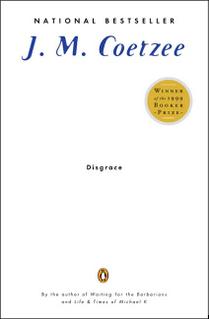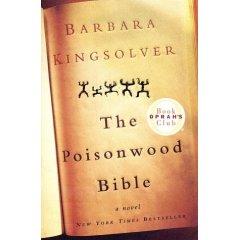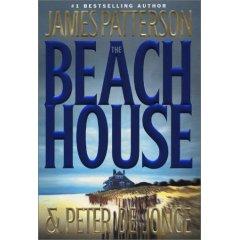
written by J.M. Coetzee
This novel was recommended to me by Michelle, my book-loving sister-in-law who is a librarian at the Plymouth Library (and whom I can always count on as a great source for thought-provoking literature!). It tells of the pitiful demise of David Lurie, a white South African professor whose indiscriminate sexual appetite winds up getting him fired after he seduces (rapes?) one of his students. He drops out of the university scene, intending to spend some time regrouping at the home of his earthy twentysomething daughter Lucy, who owns a combination dog kennel/organic farm. Misfortune seems to follow him, and the farm is burglarized by some thugs who also beat up Lurie and rape Lucy. The rest of the novel tells of his leaving the farm for a time to work on an opera he's writing, then returning to try to get Lucy to move away from the farm and away from danger.
Really cool elements:
- If you can get past Lurie's abhorrent view of women, the book contains some interesting paradoxes that show the moral disconnect which often plagues the human heart. For example, He nonchalantly objectifies women in general... yet seems to feel genuine love for his daughter Lucy. He is a professor of "Communications"... yet can't seem to master the art himself. He has no functional relationships in his life (even his relationship with Lucy is strained) ... yet begins to feel something resembling compassion for unwanted dogs in a veterinary clinic where he begins to volunteer. I can identify areas in my own life where similar paradoxes emerge. I think it's evidence that we have both (1) an innate thirst for virtue and "rightness," because we're all made in the image of a perfect Creator, and (2) an inexplicable attraction to abasement, because we're also born with a bent toward sin. The novel does a good job showing this. Maybe too good.
Not-so-cool elements:
- I was so repulsed by Lurie and his dehumanizing view of women that it was difficult to pay respects to the the overarching story. About the first 75 pages are devoted to a subplot focusing on Lurie's relationship with a prostitute. This sets the stage for his alarming emotional manipulation and physical seduction of Melanie (the student), which by any standards is painful to read. Later in the novel, while staying with his daughter Lucy, he matter-of-factly seduces one of Lucy's friends: middle-aged Bev Shaw, with whom he has begun working at the animal clinic. Lack of moral character is one thing, but complete and repeated disregard for the value of women really bothers me. It made me angry at the author and became such a major distraction that I had a hard time even finishing the book.
- At the end of the book (and this is a spoiler, so be warned if you plan on reading it yourself!) Lurie finds some sort of peace in arranging for the euthanization of a dog that he has become particularly attached to. I tried hard to figure out what this is supposed to symbolize, and I just couldn't come up with anything that made sense. Is he finally saying goodbye to any shred of decency he has left? Is he letting go of his desire to control his daughter's decisions? Trying to put to death the parts of his character which make him tick but which he knows are immoral? I still don't know.
- I found myself wishing for more detail about Lurie's daughter. What were her thoughts about her father and his moral demise? What were her thoughts about the rape and burglary? Did she somehow see these things as related? Didn't she fear for her safety after the assault? I thought it odd that she would choose to stay on in a place that was dangerous, even after the known rapist moved in next door with her former hired-hand. Having known closely a handful of women who have been assaulted in real life, I wish that Lucy had at least had her own voice in this story. Her character seemed underdeveloped to me.
- This might be trivial, but it seems silly that Lurie's daughter calls him "David" and not "Dad" or something similar. Is it a sign of their dysfunctional relationship? Or perhaps a sign that she never really considered him a father figure? Who knows, but it's annoying.
- Because I know next to nothing about South Africa, I wish the author would've brought in more description about the surroundings, the people, and the culture. Odd that he would even choose South Africa as a setting and then opt not to flavor the novel with lots of detail about that part of the world and its people. In fact, at times I didn't even know if certain characters were white or black (Melanie the student, some of Lurie's colleagues, Bev Shaw, the police who investigated Lucy's rape and burglary), and whether this had any impact on their interrelationships.





